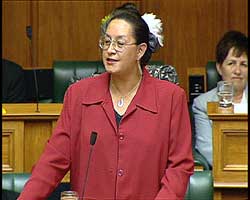
Georgie Girl 2001
Distributed by Women Make Movies, 462 Broadway, New York, NY 10013; 212-925-0606
Produced by Annie Goldson
Directed by Annie Goldson and Peter Wells
VHS, color, 52 min.
College - Adult
Gay and Lesbian Studies, Biography, Gender Studies, Political Science, Sociology, Women's Studies
Date Entered: 11/09/2018
Reviewed by Ramona Islam, DiMenna-Nyselius Library, Fairfield UniversityWhile documenting the life of one unique and accomplished individual, this documentary celebrates the power of self-knowledge to break through barriers and shape the world. In the opening scene, we witness Georgina Beyer addressing the New Zealand Parliament, whose membership is punctuated by firsts: the first Rastafarian MP, the first Green MP, and Georgina herself— the first transsexual and the first Polynesian MP. Elected to parliament in 1999, Beyer began her political career in the small town of Carterton, where she served as District Counselor, and later, became Mayor. When she left fast-paced Wellington for rural Carterton, she was seeking a better life, not a career in politics. Even so, fellow students from her life skills training course recognized, in her, a leader with a depth of empathy and a breadth of life experience. They persuaded Georgina to seek office, and her charisma proved formidable against entrenched politicians. Representing the Labour Party in a mostly white, traditionally conservative electorate, she managed to win the votes, and continues to win the hearts and minds of a majority of her constituents.
Georgina’s life has not been easy. Born George Beyer to a mother of Maori descent, George’s parents divorced, and the boy was sent to live on his grandparent’s farm. Throughout his youth, George felt inclined to associate with Maori children, but was given few opportunities. His inclinations to adopt feminine behaviors were likewise thwarted, so that George felt disconnected from his true nature. Adolescence led him to a job as a night porter in Aukland, where he discovered drag show cabaret, joined the nightclub circuit, and commenced his female identity. As a performer, the new Georgina mingled with a variety of individuals, from singers and actors to gay men and sex workers. She sang and danced in costume, and won acting roles on television. Though glamorous, the lifestyle proved risky and unfulfilling. After suffering through a rape and beating, Georgina wanted to improve her life. She had sex change surgery, and proceeded to earn a television award recognizing a female actor in a dramatic role. From that point on, she was typecast as a transsexual, prompting her to look beyond the entertainment profession.
Beyer’s story is told through the lens of critically acclaimed filmmakers Annie Goldson and Peter Wells, both hailing from New Zealand. Goldson and Wells seamlessly have woven together footage of Georgina at work in Parliament with candid commentary from her supporters within the community and shots of the New Zealand countryside. Historical clips further enrich the tapestry, including childhood photographs, scenes from her work in show business, and interviews with drag queens from her nightclub years. Consistently shining through the narrative is Georgina’s flair for humor and her quest for equality. Lacking from the documentary are details of her voting record and specific political endeavors. While it would be helpful to examine Georgina’s accomplishments in office, this portrayal of her life story will be particularly enlightening for any student of social progress, making Georgie Girl a must-have for public and academic libraries alike.